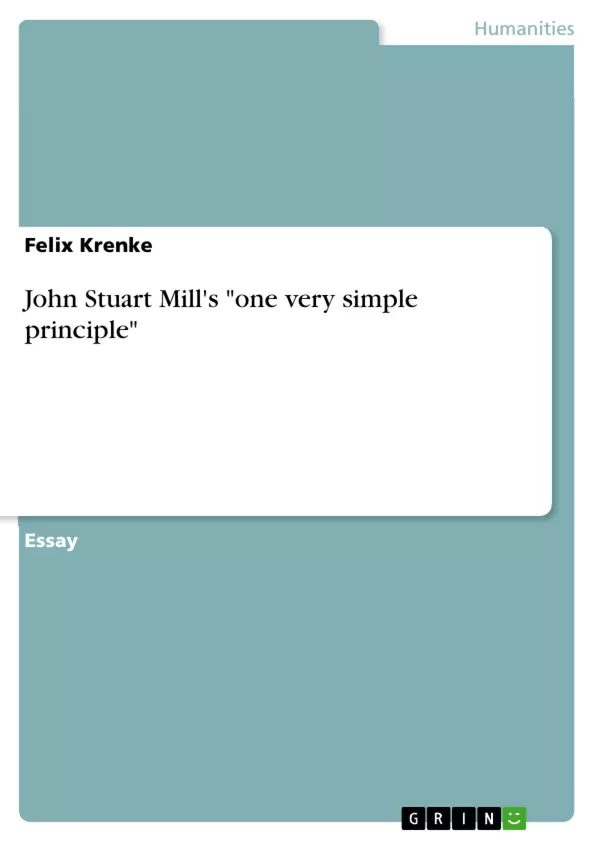In the following essay I am going to position myself towards the Harm Principle as outlined in John Stuart Mill's On Liberty. I will present problematic aspects of the Harm Principle, give an answer to whether I agree with it and embed it into a larger context of ethics. In this I will briefly compare Mill's Harm Principe and Kant's Categorical Imperative in terms of social and individual value.
To begin with, an attempt to give a satisfying answer to the question at hand asks for some solid definitions. Mill in his work On Liberty is concerned with “civil, or social liberty: the nature and limits of the power which can be legitimately exercised by society over the individual.” (Mill, 1859) Since liberty as a basic principle is of great importance in On Liberty as well as in what is to follow, I will clarify my notion of it by aid of the Oxford Dictionaries. Liberty is “the state of being free within society from oppressive restriction by authority on one's behaviour or political views” ('Liberty', Oxford Dictionaries.) I accept this definition in that I mean this very grasp on liberty when I make use of the term in the following passages. Moreover, the term 'harm' needs to be narrowed down to and I would love to include a definition by Mill but On Liberty, unfortunately, does not provide us with a firm definition of what is to be classified as harm. He does however give a clear version of what not to consider harm. Subsequently I need to give my definition of 'harm' for the sake of giving my view on the Harm Principle.
I consider harm to be either the violation of the individual’s will or the infliction of physical as well as psychological injury. Moreover, I agree with Mill's opinion on what shall not be perceived as harm, namely the “success in an overcrowded profession or in a competitive examination”. (Mill, 1859) This picks out the passive infliction of harm. However even when two individuals’ freewill cannot be accounted for without violating the other, “society admits no right, either legal or moral, in the disappointed competitors to immunity from this kind of suffering” according to Mill. (1859:164) The society should however interfere when ”force”, “fraud or treachery” where invoked against one of the individuals by the other party. (Mill, 1859). I agree with this notion of the 'minor harm' and can finally discuss the Harm Principle itself.
Table of Contents
- John Stuart Mill's 'one very simple principle'
- Problematic Aspects of the Harm Principle
- The Harm Principle and its Ethical Background
- The Impact of the Harm Principle
- Utilitarianism and the Harm Principle
- The Need for Discourse
Objectives and Key Themes
This essay aims to explore John Stuart Mill's Harm Principle as presented in his work On Liberty, examining its problematic aspects, its ethical framework, and its impact on social and individual values. It also seeks to place the Harm Principle within a larger context of ethics by comparing it to Kant's Categorical Imperative.
- The Harm Principle and its limitations
- The ethical foundation of the Harm Principle
- The relationship between individual liberty and social order
- The role of utilitarianism in Mill's philosophy
- The importance of free speech and open discourse
Chapter Summaries
- The essay begins by defining key terms like liberty and harm, acknowledging the lack of a definitive definition of harm in Mill's work. It then introduces the Harm Principle, arguing that its application should be guided by public institutions representing societal interests and individual well-being.
- The essay then delves into the problematic aspects of the Harm Principle, highlighting the vagueness of Mill's language and the difficulty of defining when individuals are "in the maturity of their faculties." It explores how Mill's concept of "taking care of others" raises concerns about the potential for restrictions on personal freedom.
- The essay examines the connection between the Harm Principle and Mill's utilitarian philosophy, demonstrating how the principle extends beyond merely preventing harm to others, incorporating the pursuit of happiness, pleasure, and the absence of pain.
- The essay concludes by discussing the implications of Mill's ideas for social interaction and the importance of free speech and discourse. It emphasizes the need for individuals to engage in open dialogue and consider diverse perspectives to determine what constitutes good and evil.
Keywords
The essay focuses on key concepts such as the Harm Principle, individual liberty, social order, utilitarianism, free speech, and open discourse. It also draws connections between Mill's ideas and those of other thinkers, such as Kant, Plato, and Socrates.
Frequently Asked Questions
What is John Stuart Mill's Harm Principle?
The Harm Principle states that the only purpose for which power can be rightfully exercised over any member of a civilized community, against his will, is to prevent harm to others.
How does Mill define 'harm' in "On Liberty"?
Interestingly, Mill does not provide a firm definition of harm, but he clarifies what is NOT harm, such as fair competition in exams or professions.
How does the Harm Principle relate to Utilitarianism?
The principle is grounded in utilitarian ethics, aiming to maximize pleasure and minimize pain while protecting individual liberty as a means to societal progress.
What is the difference between Mill's Harm Principle and Kant's Categorical Imperative?
The essay compares them in terms of social and individual value, looking at how each framework balances personal freedom against moral duty.
Why is free discourse important according to Mill?
Mill argues that open dialogue and considering diverse perspectives are essential for a society to determine what is truly good or harmful.
- Arbeit zitieren
- M. A., M. Ed. Felix Krenke (Autor:in), 2014, John Stuart Mill's "one very simple principle", München, GRIN Verlag, https://www.grin.com/document/1007997



